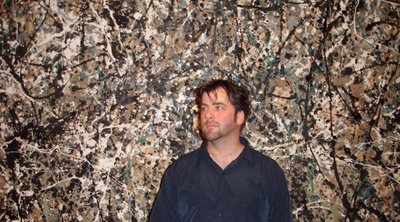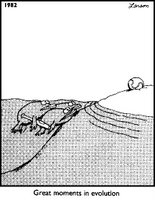
Tuesday, April 18, 2006
Monday, April 10, 2006
Friday, April 07, 2006
Octopunk stays up really late

I just really wanted to get my lego stuff uploaded, is all. Check out my Brickshelf page for a bunch of the new pictures I took last weekend. You can tell the new stuff because the backgrounds are much whiter. I particularly recommend the Nova Blade and the Zeppelin.
Meanwhile, let me mention this: whenever I finish a new lego creation, when I finally get it perfect, for a while afterwards it's like I have a crush on the thing. I bring it with me places so I can constantly look at it and pick it up. Well, the other day while I was packing up my stuff to go get it photogrified, I whipped out these two little robots -- and I can't get enough of them! They're so small and easy, when I realized I'd left them at Adam's on Monday, I just built another pair. I threw the necessary parts in my pocket and assembled them on the train to work.
I don't even have an idea of what they're for, but I do know that when they raise up on their wheels like that, they go really fast.
Thursday, April 06, 2006
Scientists discover first animal to say "Screw this Stupid Ocean"
 Fossil animals found in Arctic Canada provide a snapshot of fish evolving into land animals, scientists say. The finds are giving researchers a fascinating insight into this key stage in the evolution of life on Earth.
Fossil animals found in Arctic Canada provide a snapshot of fish evolving into land animals, scientists say. The finds are giving researchers a fascinating insight into this key stage in the evolution of life on Earth. The 383 million-year-old specimens are described as crocodile-like animals with fins instead of limbs that probably lived in shallow water.
Before these finds, palaeontologists knew that lobe-finned fishes evolved into land-living creatures during the Devonian Period. But fossil records showed a gap between Panderichthys, a fish that lived about 385 million years ago which shows early signs of evolving land-friendly features, and Acanthostega, the earliest known tetrapod (four-limbed animals) dating from about 365 million years ago.
In 1999, palaeontologists set out to explore the Canadian Arctic in an attempt to find the "missing link" that would explain the transition from water to land. After several years of searching with very little success, they hit the jackpot in 2004.
"The really remarkable find came when one of the crew found a snout of a flat-headed animal sticking out of the side of a cliff - that is totally what you want to find because if you are at all lucky the rest of the skeleton is back in the cliff," said Professor Shubin. The team found three near-complete, well-preserved fossils of the new species, Tiktaalik roseae, in an area of the Arctic called the Nunavut Territory. The largest measures almost 3m (9 ft) in length.
The creature shares some characteristics with a fish; it has fins with webbing, and scales on its back. But it also has many features in common with land animals. It has a flat crocodile-like head with eyes positioned on top and the beginnings of a neck - something not seen in fish.
 "When we look inside the fin, we see a shoulder, we see an elbow, and we see an early version of a wrist, which is very similar to that of all animals that also walk on land," said Professor Shubin. "Essentially we have an animal that is built to support itself on the ground."
"When we look inside the fin, we see a shoulder, we see an elbow, and we see an early version of a wrist, which is very similar to that of all animals that also walk on land," said Professor Shubin. "Essentially we have an animal that is built to support itself on the ground." The scientists believe the position of the creature's eyes suggest it probably lived in shallow water.
Dr Andrew Milner, a palaeontologist
 from the Natural History Museum, UK, said it is unusual to find a fossil like this in such good condition. "This material is amazing because it includes a nearly complete skeleton - which is always handy because instead of assembling the fossil from bits we can see the whole skeleton and be sure that this is how the animal was put together."
from the Natural History Museum, UK, said it is unusual to find a fossil like this in such good condition. "This material is amazing because it includes a nearly complete skeleton - which is always handy because instead of assembling the fossil from bits we can see the whole skeleton and be sure that this is how the animal was put together." Professor Jennifer Clack, from the University of Cambridge, said that the find could prove to be as much of an "evolutionary icon" as Archaeopteryx - an animal believed to mark the transition from reptiles to birds.
A cast of one of the fossils will be on display at the Science Museum in London from Thursday.
Subscribe to:
Comments (Atom)
